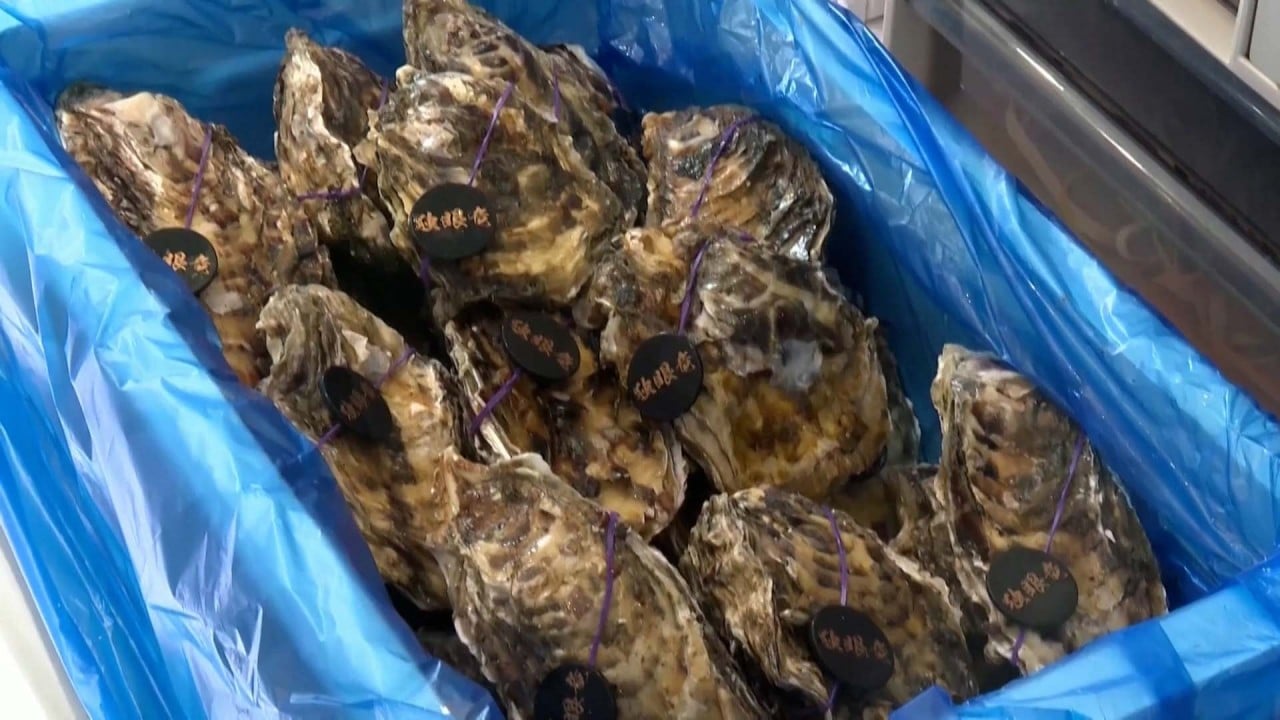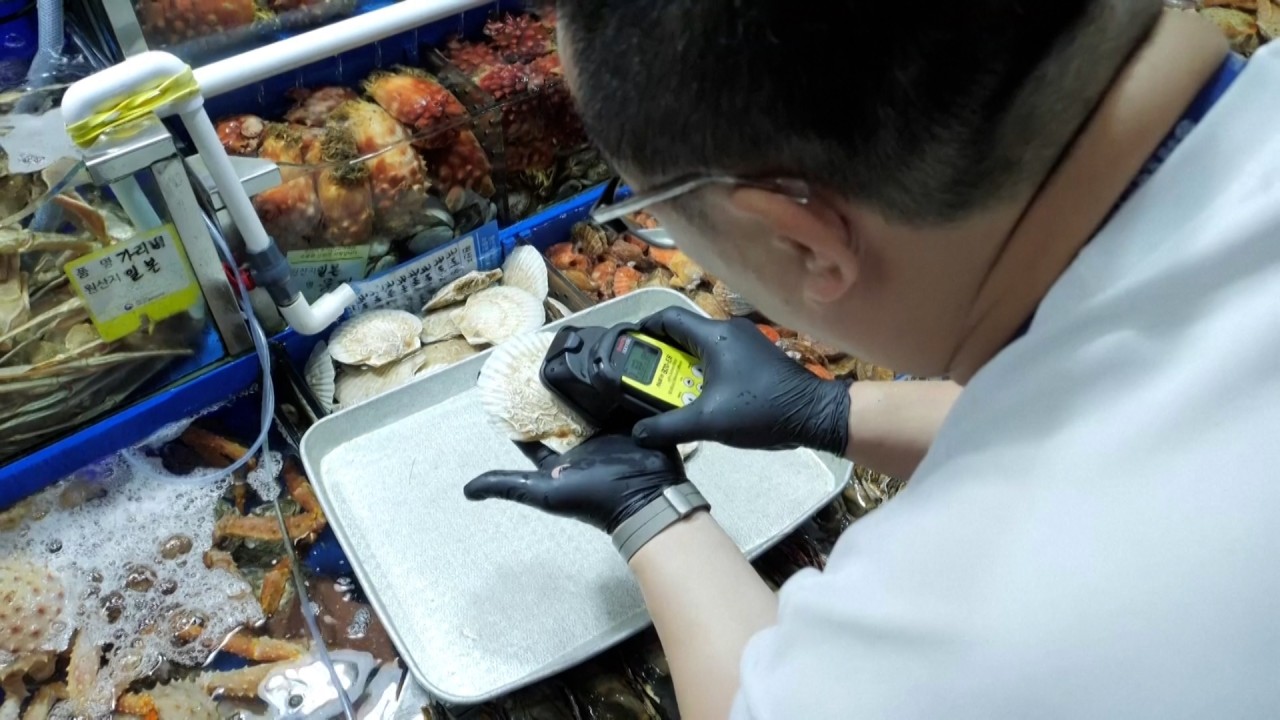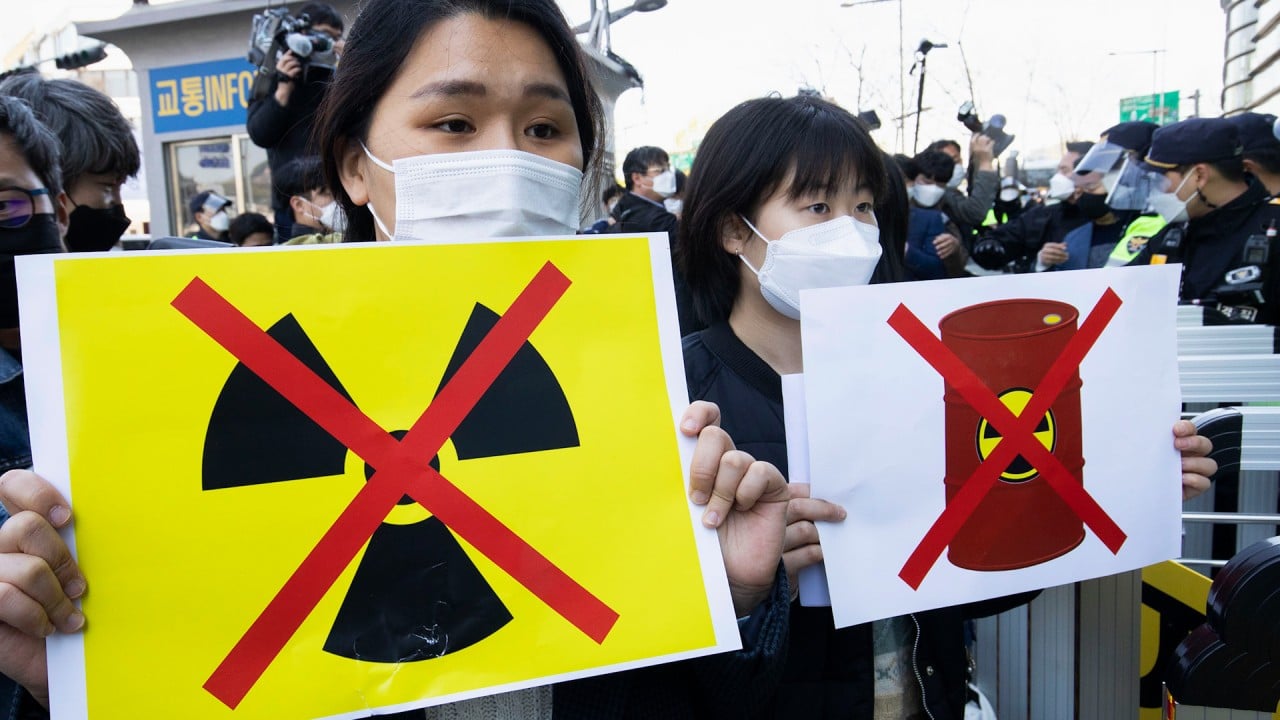
01:19
China imposes ban on Japanese seafood over Fukushima water release plan
China imposes de facto ban on Japanese seafood imports amid anger over Fukushima water release plan
- China’s customs agency says the plan fails to fully reflect expert opinions, with authorities vowing to take all necessary measures to ensure consumer safety
- Hong Kong will also consider banning seafood and agricultural products from ‘high-risk regions’ in Japan, says the city’s chief executive
Faced with mounting concerns over the safety of edible imports from Japan, mainland China has vowed to take “all necessary measures” to abate the worries of its consumers.
This includes extending a ban on imports from 10 Japanese prefectures, including Fukushima, while also deciding to fully screen all shipments from other regions, instead of just spot checking, amid concerns of residual nuclear contamination.
Mainland China’s General Administration of Customs said the plan to discharge the water from the 2011 nuclear disaster “failed to fully reflect expert opinions” and that it will take “all necessary measures” to ensure the safety of Chinese consumers.
Since the Fukushima nuclear disaster in 2011, China’s customs have attached great importance to the issue of radioactive contamination of Japanese food
Food from other parts of Japan, especially edible aquatic products, will also receive “strictly 100 per cent” screening of their certification documents and be inspected.
“Since the Fukushima nuclear disaster in 2011, China’s customs have attached great importance to the issue of radioactive contamination of Japanese food imported to China. It has closely monitored the relevant measures taken by the Japanese government, continued to assess the risk and responded promptly,” the customs agency said on Friday.
Chief Executive John Lee Ka-chiu on Friday also said Hong Kong would consider banning seafood and agricultural products from “high-risk regions” in Japan.
“For food imports from other areas, we will strengthen monitoring to ensure food safety,” he added during a visit to Guiyang, Guizhou province.
Japan is mainland China’s fifth-largest trade partner, but the new arrangements could greatly slow the import process of sea products, potentially resulting in a de facto ban.
Its agricultural, forestry, fishery and food exports rose by 14.3 per cent from a year earlier to 1.4148 trillion yen (US$9.8 billion) last year, according to Japanese government data.
Aquatic product exports reported significant growth last year, with scallop shipments alone rising by 10.5 per cent, year on year.
According to Japan’s Ministry of Agriculture, Forestry and Fisheries in February, the export value of Japanese agricultural, forestry and food products to mainland China in 2022 reached 278.3 billion yen.
Seafood, such as scallops, and Japanese sake are widely popular in the Chinese market.
Mainland China is believed to have significantly reduced its seafood imports from Japan over the past decade, despite its overseas sea product purchases growing by 35 per cent to US$191.3 billion last year, according to data from the International Trade Centre. The import volume also rose by 21 per cent, the data showed.
Ecuador is mainland China’s top supplier of seafood imports, followed by Russia, Vietnam, India, Canada and the United States.
“Chinese customs will continue to strengthen the detection and monitoring of radioactive substances, ensure the safety of Japanese food exported to China, and strictly prevent the import of risky products,” the customs agency said.
It will also “maintain a high level of vigilance and take absolute responsibility to domestic consumers as the principle”.
On Tuesday, the International Atomic Energy Agency (IAEA) approved Japan’s plan to release the water, saying it met international standards and that the radiation impact on people and the environment could be considered negligible.
“With the authenticity of the data and accuracy of the information yet to be confirmed … the IAEA’s conclusion is not convincing,” said China Atomic Energy Authority secretary general Deng Ge.
At this stage, there is no sufficient proof of the reliability and legitimacy of Japan’s plan to discharge waste water into the sea
Hong Kong Chief Executive Lee also questioned whether Japan’s discharge plan met global safety standards, adding that the city’s multi-department task force set up to review Japanese food safety might restrict imports if Tokyo decided to discharge the water.
“At this stage, there is no sufficient proof of the reliability and legitimacy of Japan’s plan to discharge waste water into the sea. The plan takes place over many years, almost 30 years, so it is difficult to maintain certainty about the standards,” he added.
The conclusions in the report have not received unanimous agreement, according to mainland China’s customs agency.
“The Japanese side still has many problems in terms of the legitimacy of the sea discharge, the reliability of the purification equipment, and the completeness of the monitoring plan,” it said.
China urges Japan not to use the report as a permit for the discharge plan
“The discharge of nuclear-contaminated water from Japan into the sea has become the focus of global attention.
“It has also caused Chinese consumers to worry about the safety of food imported from Japan.”
Mainland China’s National Nuclear Safety Administration said two day earlier that it would keep monitoring radiation levels in the ocean following the waste water discharge from Fukushima, and it would issue timely warnings if abnormalities were found.
IAEA chief Rafael Grossi told Reuters on Friday that international experts behind the report have differing opinions on the assessment and that some may have concerns.
Chinese foreign ministry spokesperson Wang Wenbin said at a regular press conference on Friday that IAEA’s report was hastily issued and there were limitations and biases in its conclusions.
“China urges Japan not to use the report as a permit for the discharge plan,” he said.




